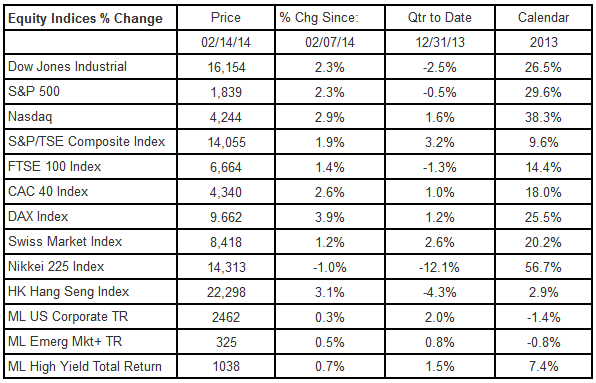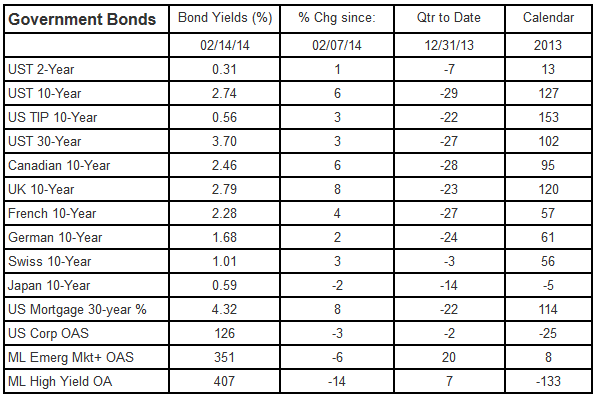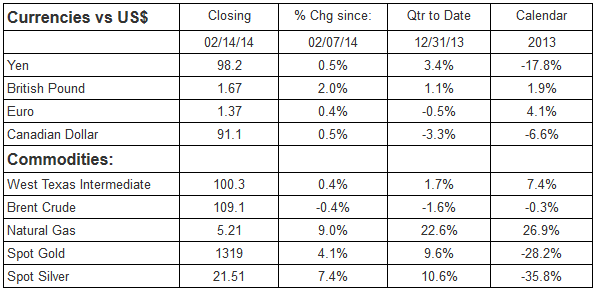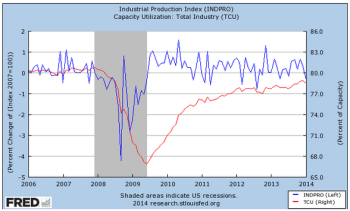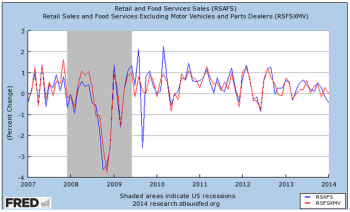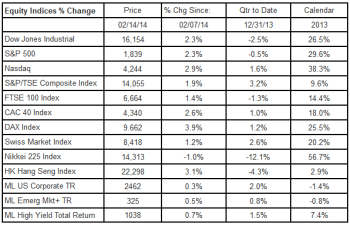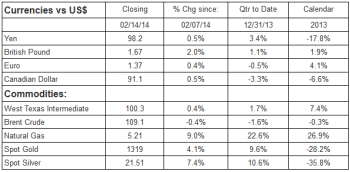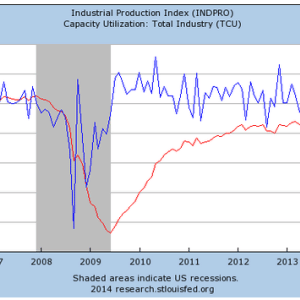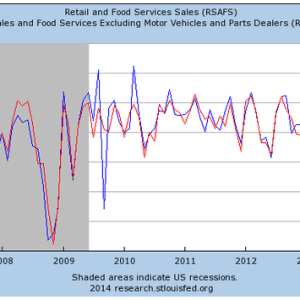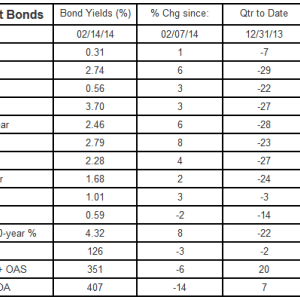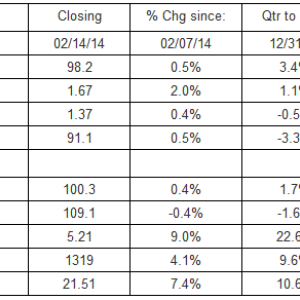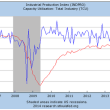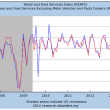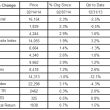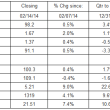John Davidson's Economic Comments: Week ending Feb. 14
U.S. economic releases were softer than expected, but European releases were a bit better this week. Nonetheless, the equity markets rallied and the bond markets fell across the globe. Credit spreads narrowed, generating positive returns for the credit-sensitive sectors of the bond market for the week. The U.S. dollar fell; oil prices were mixed; and natural gas and metals commodity prices were higher on the week.
Perspective:
With mixed to softer economic releases, why were equity prices so strong across the globe? My guess is that events in Washington may have given the markets a boost. First, the lifting of the debt limit assured investors that partisan politics were not going to prevent the U.S. from paying its bills. Secondly, new Federal Reserve Chair Janet Yellen stood up well to six hours of testimony and questioning by Congress this week. She promised a continuation of Bernanke policies, which she had helped to formulate. She committed to continuation of tapering unless a "notable" change in outlook took place. In questioning she continued to champion the independence of the Federal Reserve, without the interference of CBO audits. This was of particular importance because the Fed may be required to do things that are necessary, but unpopular (like tighten monetary policy in the face of rising inflationary pressures); something that Congress has not been able to do. My own admiration for the new Fed chair was also increased this week while I visited my sister, who served under Yellen when she headed the San Francisco Fed. My sister had sent Yellen a box of chocolates in congratulations for her confirmation. With all the preparation for her new assignment, first FOMC meeting and chairmanship, Yellen took the time to write my sister a handwritten note. That was a class act and a sign of the personal skills that Yellen brings to her new role.
Economic Releases:
U.S. Industrial Production (blue in the chart) fell -0.3% in December; Capacity Utilization (red in the chart) fell to 78.5%; and both were below the range of expectations and show that the manufacturing sector has been losing traction over and above weather-related impacts.
The consumer slipped in January. Retail Sales (blue in the chart) fell -0.4%; ex-autos, Retail Sales (red in the chart) were flat. Both numbers were below consensus and follow downward revision for December.
Other Economic Releases
U.S. Initial Jobless Claims may have been muted by weather, but they were not an indication of strengthening of the job market. Initial Claims increased 8,000 to 339,000 while the four-week average of Claims increased by 3,000 to 336,750 the week of Feb. 8. Continuing Claims, which are reported on a one-week lag, fell by 18,000 to 2.953 million.
European Union Industrial Production fell -0.7% in December. The flash report of EU fourth-quarter GDP was +0.3%; Germany's flash GDP was +0.4%; France's GDP was +0.3%; all flash reports were a tick better than expected.
Consumer Prices in China rose 1.0% in January, just 2.5% year-over-year, but Producer Prices fell -0.1%, -1.6% YOY.
Equities Markets:
This was a second positive week for the American and European stock markets; the Nikkei was the only one in the table to post a negative return. Narrowing spreads generated positive returns for the Merrill Lynch credit market indices even though government yields rose on the week. Even after these positive weeks, over half of the indices below have yet to post a positive year-to-date return.
Bond Markets:
Government Bond market yields were higher in almost all markets, Japan's bonds being the exception. Credit spreads for corporate credit narrowed.
Currencies & Commodities:
The U.S. dollar fell against the other four currencies listed in the chart. Oil prices were mixed with an increase in WTI and decrease in Brent on the week. Natural Gas and metals prices rose on the week.
Who is John Davidson?
John W. Davidson, CFA, started writing these Comments more than a decade ago as a personal discipline when he was promoted to from portfolio manager to chief investment officer and CEO.

Most recently, he was the president of PartnerRe Asset Management Corporation, responsible for the management of PartnerRe's invested assets, which grew from $4 billion to $12 billion during his tenure. After joining PartnerRe in the fall of 2001, he hired the staff, built the trading floor and created the infrastructure to manage both fixed income and equity assets internally. He retired from PartnerRe at the end of 2008 and moved to Maine, where he focused on board work.
He has more than 35 years of industry experience, including positions with investment management responsibility for separate institutional accounts, mutual funds, trusts and insurance assets. Prior to joining PartnerRe, he served as president and chief executive officer of two other investment management companies. For various companies he has held positions as chief investment officer, chief economist, head of fixed income and portfolio manager. As a portfolio manager, Davidson managed and traded U.S. Government Securities as well as futures and options on fixed income instruments.
His real world experience is backed by a strong academic foundation, which includes earning a Master of Business Administration in finance and a Master of Arts in mathematics from Boston College, as well as a Bachelor of Arts, cum laude, in economics from Amherst College. He holds the professional designation of chartered financial analyst.
His experiences and credentials have brought him to the public as a television commentator and conference speaker. In addition to his frequent past appearances on CNBC, CNNfn, Bloomberg TV and Yahoo FinanceVision, he appeared as a special guest on Wall $treet Week with Louis Rukeyser. Reuters, Bloomberg and other business press services have quoted his views on the market. He has taught CFA preparation programs, as well as other courses offered by the Stamford and Boston CFA Societies, and the National Graduate Trust Officers' School.
Davidson is a natural leader in both his professional and personal life, having developed those skills early in his career as a naval officer. He spent three years on active duty, which included a year on the rivers of Vietnam, and 24 years in the Naval Reserve, from which he retired as a captain in 1994.
Davidson is treasurer and board member of the Camden Conference. He is also on the investment committee of the Pen Bay Health Foundation. He serves as an independent trustee for mutual funds.
In his leisure time, he is an active sailor, tennis player and skier. With his wife, Barbara, he renovated a 100+-year-old home in Camden, where they enjoy spending time with their two golden retrievers and having visits from their five children. He can be reached at jwdbond@me.com.
Event Date
Address
United States



